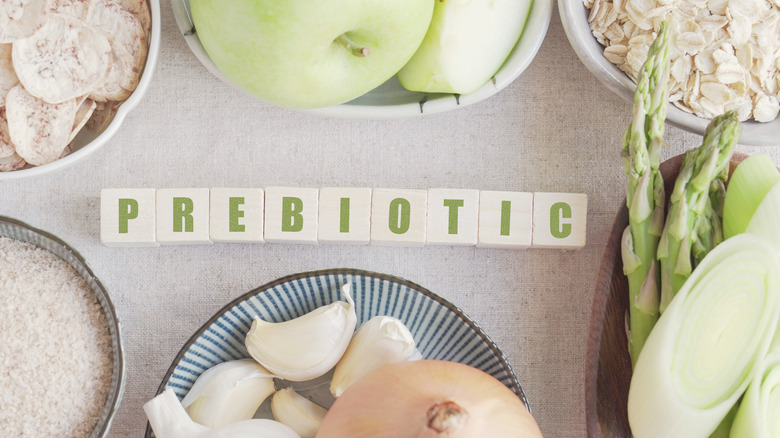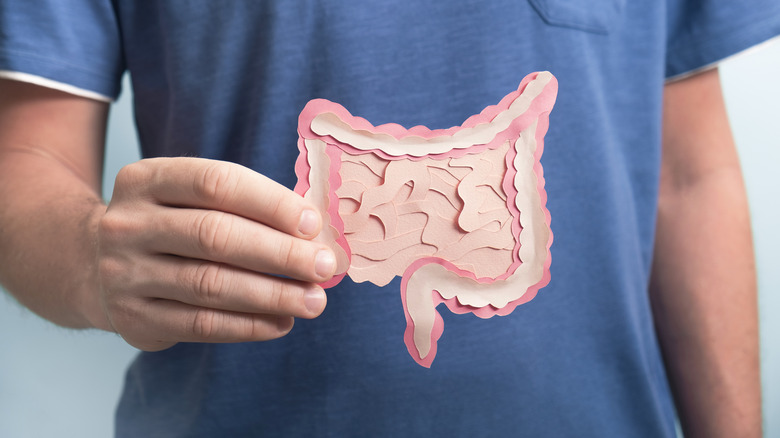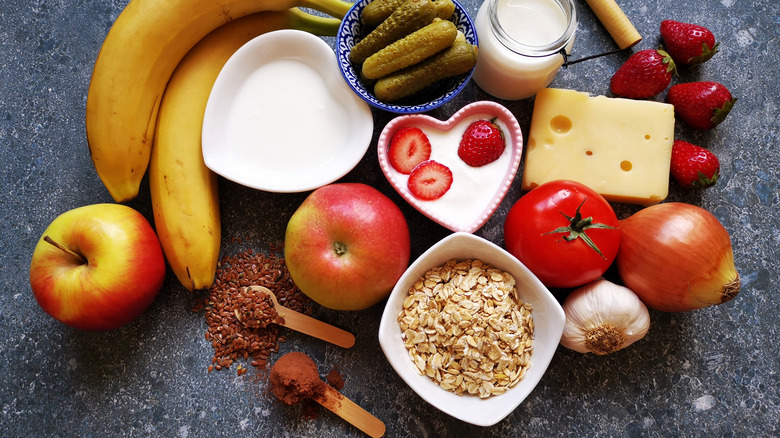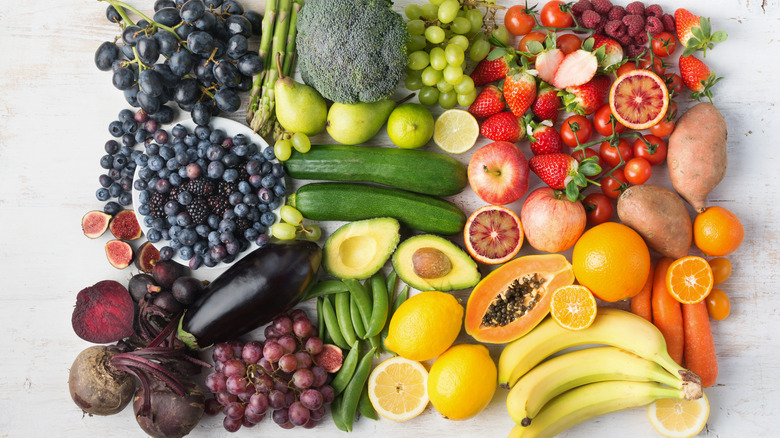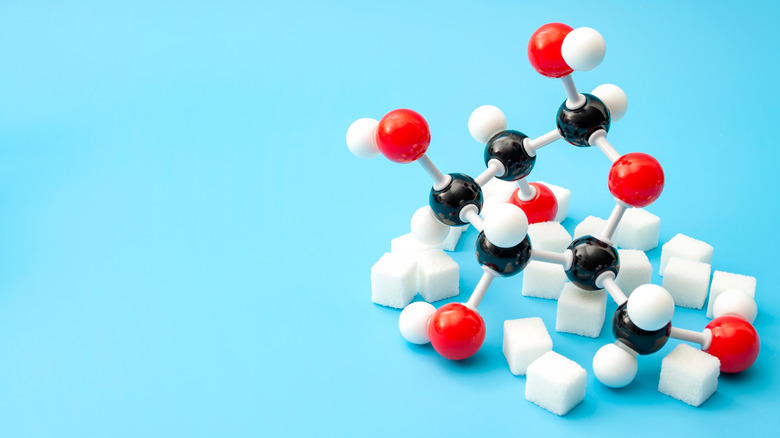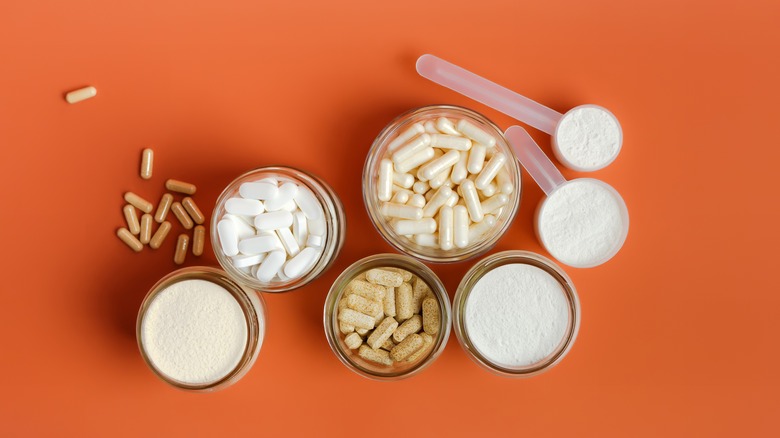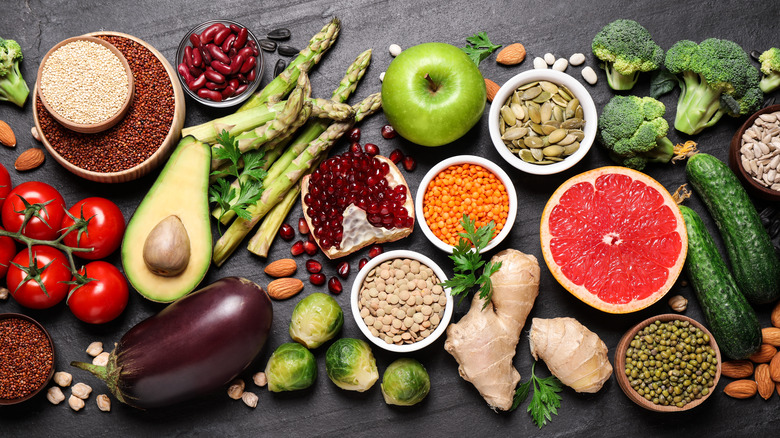Everything You Wanted To Know About Prebiotics
Prebiotics might seem like the latest health trend to emerge from the depths of your local health food store, but there's a good reason for their popularity. Prebiotics work collectively with their popular, gut-bacteria-balancing counterpart, but they exist in a category all of their own. However, research regarding these tiny, little fibers continues to be conducted in order to gain a deeper understanding of how they fit into a complete picture of health.
Prebiotics are mostly found in fiber-rich foods and can assist with the natural fermentation processes that take place within the gut. While this may sound kind of gross and off-putting, prebiotics can actually add to the health of our guts — not just create gas (via Medical News Today).
With prebiotics now on your health radar, you may have some questions: How did we go so many years only hearing about probiotics? What do prebiotics do and how much of them should you consume? Is there ever a good time to supplement prebiotics? Here is everything you need to know.
Prebiotics are different from probiotics
Don't let the name similarities fool you, prebiotics and probiotics are two very different things that have different functions within our bodies. They do, however, run in the same circles, so to speak. Although they interact, you can consume one without consuming the other. Prebiotics are found in fibrous foods such as fruits, vegetables, and whole grains. They are carbohydrates that pass through the GI tract without being digested, according to WebMD.
Conversely, probiotics are little living creatures like bacteria and yeasts that promote healthy gut functioning. Probiotics are microorganisms that are found in fermented foods like yogurt and sauerkraut. They are often supplemented, but just because probiotics can be supplemented doesn't mean they have to be. In fact, consuming a varied and healthy diet often can provide enough prebiotics and probiotics to support gut health. Prebiotics can be found in some probiotic-rich foods, so consuming these combination foods seems like a pretty efficient way to seek out healthy gut function (via WebMD).
Prebiotics and probiotics work together for overall health
Prebiotics and probiotics may be different, but they work as a team to cultivate overall gut health. Prebiotics essentially act as food for the living probiotics, as explained by Medical News Today. This is why these two compounds are able to harmoniously work together to promote health within our gastrointestinal system — one feeds the other. And since prebiotics give fuel to probiotics, it is valuable to consume a healthy balance of the two. However, much of the research regarding prebiotics and probiotics' interactions is ongoing (via Medical News Today).
One of the more fascinating areas of study when it comes to prebiotics is in breastmilk. Infants receive them from their mothers' breastmilk. The sugars in breastmilk contain a lot of prebiotics and many infant formulas are fortified with them. This means that we are exposed to prebiotics from the very beginning of our lives.
As you grow up, though, a diverse, healthy diet is the key to getting enough prebiotics and probiotics. If you are concerned that your diet is not incorporating a healthy balance of pre- and probiotics, seek guidance from your doctor or a registered dietitian so you can work your way towards optimal gut health (per Medical News Today).
Prebiotic foods
As mentioned, prebiotics are found in a plethora of healthy foods, many of which we already know to be good for digestion and gut health at large. Some of the basics include apples, bananas, berries, green vegetables, tomatoes, onions, garlic, and legumes. Some whole grains, such as wheat contain them, as well as flax seeds, barley, chicory, soybeans, and more (via WebMD).
Some products that you can find at your local grocery store come fortified with prebiotics. When a food is fortified with prebiotics, it essentially means that the prebiotics were added in during processing because they are not naturally found in that food source, according to Healthline. These products often include things like baby formulas, cereal, bread, and yogurt.
If you are on the hunt to include prebiotic fortified foods in your diet, WebMD cautions that it is unlikely to actually see the word "prebiotic" on a food label. Instead, look for ingredients such as inulin, chicory fiber, oligofructose, fructooligosaccharides, and galactooligosaccharides. Additionally, xylooligosaccharides are prebiotics that are most abundantly found in honey and bamboo shoots. Although that is where they are found in nature, their numbers are too small to truly have a prebiotic effect, according to "Microbial Production of Food Ingredients and Additives" (via ScienceDirect). Xylooligosaccharides are also often added to fortified food products, such as sports drinks and bars, cereals, and dairy products.
Promising research regarding glucose regulation
Perhaps one of the largest and most potentially beneficial topics of study regarding prebiotics is the relationship that they have with blood sugar. Specifically, research has shown that prebiotics and probiotics may help regulate blood sugar. One study published in Advanced Pharmaceutical Bulletin found that a diet that contains both prebiotics and probiotics can have an impact on glucose regulation in the bloodstream. As an added benefit, the same study concluded that consuming both pre- and probiotics can aid in the metabolism of lipids, or fats, within your body.
However, it is not advised to use prebiotics as a way to manage diabetes. While the research that has been conducted looks promising, more is still needed. As of this writing, the brilliant minds behind this study suggest using prebiotics as a complementary modality. "[Supplementation] can result in improvements in lipid metabolism and glucose homeostasis in type 2 diabetic patients," the researchers concluded.
Prebiotics can help you absorb calcium and other minerals
Since many people, women in particular, have to start examining their risk of bone density loss long before the effects start to take hold, the more ways that science finds to help prevent this, the better. As we age, our bones tend to lose some of their natural oomph (per Healthline). While this is a normal part of the aging process, decreasing people's susceptibility to fractures is hugely beneficial (because who wants their bones shattering all willy-nilly? No, thank you).
Most of the calcium in your body is absorbed from the latter portions of your intestines. We can actually increase the body's capacity to do so by updating the enzymatic profile of the gut. The chemical environment of our intestines is what stimulates the absorption of calcium. The leading research has yielded results that point to prebiotics having a very positive effect on calcium absorption. The more bioavailable calcium is in our bodies, the less likely we are to develop osteoporosis, which may lessen the occurrence of fractures due to bone mineral loss as we age (via The Nutrition Source).
In an interview with Summit Orthopedics, dietitian Kayley Gamm suggested "[combining] a calcium-rich probiotic food like yogurt or kefir — or a calcium supplement — with a prebiotic" as that "can help increase your body's ability to absorb the calcium."
They aid in gut health
As you've likely noticed, the main bodily pathway affected by prebiotic consumption is your gut. It's not entirely surprising then that prebiotic consumption can aid in gut health. Consuming prebiotics can help expedite the fermentation process of food in your gut. While the idea of foods fermenting inside your body may make your stomach turn like you're on Space Mountain, it's an important process. This allows foods to "spend less time in your digestive system," WebMD explained. This process is of benefit to your digestive function, and, of course, your bowel function (though not in the same way as Space Mountain, thankfully).
The jury is still out on whether or not prebiotics are the best way to treat constipation, but prebiotic use can help move things along, according to Healthline. Prebiotics have been shown to increase the consistency of bathroom visits, while also beneficially impacting the frequency of each visit.
Prebiotics might even help heal certain gut conditions
Beyond just helping your bathroom habit's consistency, texture, and ease of movement, research suggests that prebiotic use may effectively help manage the symptoms of other gut-related conditions (via Healthline). Of course, chronic constipation is at the top of the list when it comes to conditions that can be eased by prebiotics. Naturally occurring substances that can help ease painful constipation are always worth knowing about, especially if you're prone to such conditions.
Some research into prebiotics and irritable bowel syndrome (IBS) has been conducted. IBS is a common, long-term condition that causes gastrointestinal distress, gas, bloating, diarrhea, and more. Some people can manage their IBS through diet and lifestyle, while other people need more medical intervention to cope (via Mayo Clinic).
While experts are not currently recommending prebiotic use to treat IBS, especially without guidance from a doctor, there is some research that suggests a link between lessened symptoms and the consumption of a balance of pre- and probiotics (via Healthline).
They may improve your metabolic health
Some components of metabolic health may actually improve with the consumption of prebiotics. These are things like blood triglyceride levels and cholesterol, in addition to the effect prebiotics may have on blood sugar regulation, which is a part of metabolic processing (via Healthline). The prebiotic inulin has been most commonly studied when it comes to metabolic health.
An analysis published in the Journal of Translational Medicine found demonstrated that prebiotics helped reduce triglycerides and cholesterol in people with diabetes and prediabetes. Triglycerides are a type of fat that is stored in your body after you eat a calorie surplus. Your body will utilize the fuel it needs and then save the rest as triglycerides in your fat cells. Heightened levels of blood triglycerides are linked to an increased risk of heart disease, which is why it is so valuable to take health measures to stabilize the levels of them in your body (via Mayo Clinic).
Cholesterol is tricky because there are two kinds: "good" (HDL) and "bad" (LDL). Our bodies definitely need some cholesterol for healthy functioning, but too much LDL can lead to fatty buildup in our blood vessels. This can eventually harden and lead to heart attacks and strokes over time, explained the Mayo Clinic.
The lowdown on prebiotic supplements
Even though research is still emerging, it seems like most of the health consequences of prebiotic use are positive. This begs the question, should we supplement prebiotics? And if we choose to, is it safe?
Since prebiotics are tiny compounds that are largely found in naturally-occurring food sources, it is not thought to be necessary to supplement them, according to Medical News Today. Eating a varied and healthy diet can typically provide a healtlthy dose of prebiotics to our guts. Some people choose to supplement them anyway, which is not thought to have serious negative health consequences. The main side effects of supplementing prebiotics are gas and bloating. This is mostly because they are undigestible fibers that feed the our gut bacteria. And when our gut bacteria eats it also has to, you know, go to the bathroom in its funny, little bacteria way. If these common side effects occur, you can lower your dosage. It is popular to combine prebiotic and probiotic supplements to create a more synergistic effect (via Very Well Health).
How much to consume
Since prebiotics are relatively understudied and naturally found in healthy foods, it is unlikely that you have given much thought to how much of them you are consuming each day. Prebiotics, in particular, can be difficult to track when they come from natural food sources. While WebMD explained that there's no particular guideline, consuming 3 to 5 grams of prebiotics per day has been deemed beneficial. This is entirely possible if you consume fresh fruits, veggies, and whole grains. Eating fortified foods can also help you reach that goal, as well as taking prebiotic supplements.
According to Healthline, most prebiotic supplements contain about 1.5 to 5 grams. Before going all in on a supplement, start slowly to see how your body handles the new substance. As the publication explained, "Low doses of 2.5–10 grams per day can lead to mild symptoms like gas, [while] high doses of 40–50 grams per day could cause diarrhea."
Prebiotics can even aid in your immune function
A surprising amount of our immune function can be tied to the health of the environment in our GI tracts, also known as our microbiomes. Some of the cells in our guts are responsible for signaling immune responses. Some of these ultra-important cells maintain their health through prebiotics and "the metabolites that are formed by their fermentation," according to a 2018 report published in Current Developments in Nutrition.
Much like the other elements that relate to the larger effects of prebiotics, their relationship to immune function has not yet been studied to capacity. However, since prebiotics are thought to expedite the fermentation of foods within the gut, the byproducts are thought to impact the vigor of the immune system, according to Healthline. Butyrate, a short-chain fatty acid that is found in butter, cheese, and legumes, has been shown to have a big impact on immune cell function. Beyond that though, this specific compound has been studied because of its link to lowered incidences of colorectal cancer, among others (via ScienceDirect).
